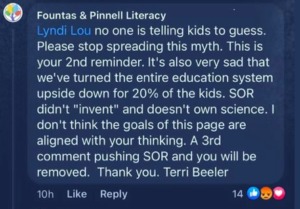It’s been a bit of a tough week for literacy giants Fountas and Pinnell.
Firstly their products were reviewed by edreports.org and found to be wanting. That’s a pretty damning indictment right there.
As a damage-control measure, the authors decided to try to ‘navigate to a place of clarity’ by producing some strange, very unclear blog posts. When those posts were roundly rejected by a large community of educators, their Facebook group admins called those educators ‘rabid’ and F&P followers labelled much of the reaction as ‘mean’.
This was followed by an extremely ill-judged comment by one of F&P’s most active and long-serving Facebook moderators, Terri Beeler, regarding a 20% who made them look bad. That moderator has been taken off Facebook duty, deleted those comments and made a half-hearted apology, citing ‘frustration’ as a reason for her dismissiveness of dyslexic children (you know, the ones in intervention, for whom LLI is supposed to be built).
She said: “It’s also very sad that we’ve turned the entire education system upside down for 20% of the kids.” Here is her post, in which she also threatens to remove someone mentioning the science of reading:
Think about that for a second. She is sad that the findings of about 100 years of research have pointed to methods and approaches that don’t match hers. That those findings are helpful for not only the kids who learn to read with ease, but the 20% who find the task difficult and everyone in between. But they don’t match her philosophy. That’s what she finds sad.
This is typical defensive behaviour and can be expected in such circumstances. I’m not here to gloat about how their damage control measures led to more damage. I’m not here to gloat about the nosedive Terri Beeler’s career looks like it’s taking due to her insensitive comments. Instead, I’m writing to talk about culture.
Terri Beeler is not a rogue operator who made a mistake. She has been moderating F&P on Facebook for a long time. She pipes up, cuts in, makes statements and decisions about who talks and who doesn’t on that page, and has done it for years, much to the obvious satisfaction of her bosses. I’ve been observing them for a long time.
No, that damning statement is not a product of one lone person who erred. That statement is a product of a culture that deems struggling children as unworthy of the resources her bosses produce. That culture runs deep in balanced literacy circles. It doesn’t stop at F&P. It is a foundational belief. It drives the acceptance of an unacceptably high failure rate. It blames children for their struggles. It places the burden of literacy acquisition on parents. It shows frustration at the obvious need to take a bottom-up approach when their philosophy mandates a top-down one (hence the “…education system upside down…” comment). It perpetuates the myth that ‘all children learn differently’ and bolsters straw man arguments like ‘one size fits all’ when describing phonics.
That frustration is born of living and breathing in a culture that says MSV is God. It is deep and broad, and it exists in many minds of many people who have power and influence over the lives of thousands of children.
This chilling culture is not in its death throes, no matter how much we wish it. Terri Beeler’s comments were a mere outward expression of attitudes that balanced literacy proponents hold true. Fountas and Pinnell are just one organisation profiting from the lure of the lack of accountability that balanced literacy affords.
The solution that I offer is to continue to raise awareness of the utter shameful wrongness of balanced literacy. It’s not one person or one company, it’s a culture. It’s a club with tens of thousands of members. It’s a bubble, an echo-chamber and it’s strengthened every time a keen teacher unwittingly graduates with a degree steeped in three cueing.
This approach damages lives, even, it would seem, the lives of those who would support it.


Great post, Lyn, and you’re absolutely right to remind your readers that ‘BL’ is not going away any time soon, especially in the US.
We need to challenge at every opportunity attempts by publishers like F&P to re-present themselves as ‘looking good’
Mind you, it’s obviously becoming uncomfortable for them when a leading apparatchik is struck down. The message must be getting through.
John
Excellent, timely post.
Even at this moment an Aus publisher of levelled readers and assessment kits is advertising their latest webinar to encourage the continued use of their predictable levelled readers together with their new decodables and ‘phonics in a box’. Sounds like a recipe for confusion to me – ie for teachers and especially their students. There’s a fair bit of enthusiasm for it in a large Facebook group for teachers.
Wishing I could say WL/BL is in its death throes. I bantered with Ken Goodman on his list serve over 40 years ago. I find it interesting the vitriolic banter hasn’t changed from when I first became an advocate. Parents who express their frustrations are labeled mean, while their bullying tactics and arrogance are unapologetic.
Thank you, Lynn, for this post and for the “utter, shameful wrongness” of F&P; I’ll be quoting you!
Thank you for this! That was me Terri responded to. I was & am still in shock she used those words.
Our children need us now more than ever. We need to take advantage of this & use it to keep spreading the awareness & getting schools on board with #SoR. We can do this!
-Lyndi Lou
What approach works best, and how can I, as a parent, put it to work?
Well said Lyn. Having read over that review and the vitriolic responses by F&P in defence of their “product”, it still saddens and frustrates me that the so called “reading wars” are alive and kicking, perpetuated and spurred on by publishers of products that leave much to be desired. In this day and age, I would hope that as educators we can all be far more knowledgeable and discerning of the “products” out there available to schools. We need to seek, learn/ relearn and question the sometimes far too “untouchable” publishers of reading materials. As an educator myself of 30 years experience who has only just in recent years “stumbled” and self funded my way along the SOR journey ( I say stumbled because I found my way in searching for better, despite the system I’m in still deeply embedded in WL/BL albeit with “ add ons” here and there starting to appear of PA), I think we still have a road ahead when both practising and pre service teachers are still not having SOR in their study. Heartening is the grass roots – educators seeking different, and the research available through key leaders sharing this on great forums and SM pages. Some state Edn systems are starting to make the shift too. More to do though!
Thank you! Moving levelled reading systems out of schools is hard work & requires a massive shift in teacher thinking and planning. Thanks for mentioning that MSV/3 cuing needs eradication from pre-service teacher training. Graduating from university with the skills and knowledge to teach reading would be a huge cost saving for schools, and imagine the impact on students!
Thank you for this post!